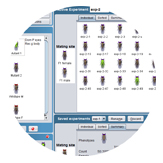Technical Instructor
MIT Department of Biology
B.S., Human Physiology, Zoology, & Chemistry, Presidency College, Calcutta University, India
M.S., Biophysics, Molecular Biology, & Genetics, University College of Science & Technology, Calcutta University, India
Ph.D., Indian Institute of Chemical Biology
E-mail: dsinha <at> mit <dot> edu
Diviya is a technical Instructor in the Biology Department at MIT for introductory Biology Courses (7.01x) and works closely with Professors Hazel Sive and Tyler Jacks for 7.013 during Spring term and with Professors Robert Weinberg and Eric Lander for 7.012 during the Fall term. Diviya’s educational interests focus on generating current, lucid, and easy-to-implement materials for the Biological Sciences that can be of interest to a diverse student population, including Biology majors and non-majors. Diviya has also been involved in training graduate student TAs and mentors and in creating a training manual that explains strategies that a TA might find useful when (i) teaching students from different majors, (ii) writing, assessing, and critiquing questions for home assignments and exams, and (iii) engaging students in course material.
Diviya has also developed curriculum for and in collaboration with the STAR Group at MIT. This curriculum is based on and utilizes various STAR software tools. Diviya worked within the STAR Group as a temporary Research Scientist and continues to collaborate with them in her role as instructor in the MIT Biology Department.
Diviya has also taught General Biology and Anatomy & Physiology (classroom and laboratory courses) at Bay State and Simmons College in Boston, Massachusetts. As an Instructor in Boston University‘s Department of Nephrology, Diviya has supervised high School, undergraduate, and graduate students involved in various projects.
While at Boston University, Diviya studied the cellular and biochemical pathways that contribute to the cell death, with the objective of better understanding the mechanism of renal failure. She also studied the cellular biology involved in the cardio-protective effect of estrogen in premenopausal females while working as a Postdoctoral Associate at Yale University. Her doctoral work resulted in identification and characterization of a novel biomarker in children with acute lymphoblastic leukemia that could be used to detect the disease and predict relapse.
Selected publications and contributions:
Sinha D, Bannergee S, Schwartz JH, Lieberthal W, Levine JS. Inhibition of ligand-independent ERK1/2 activity in kidney proximal tubular cells deprived of soluble survival factors up-regulates Akt and prevents apoptosis. J Biol Chem. 2004 Mar 19;279(12):10962-72. Epub 2003 Dec 29. Link to article
Haynes MP, Sinha D, Russell KS, Collinge M, Fulton D, Morales-Ruiz M, Sessa WC, Bender JR. Membrane estrogen receptor engagement activates endothelial nitric oxide synthase via the PI3-kinase-Akt pathway in human endothelial cells. Circ Res. 2000 Oct 13;87(8):677-82. Link to article
Mandal C, Chatterjee M, Sinha D. Investigation of 9-O-acetylated sialoglycoconjugates in childhood acute lymphoblastic leukaemia. Br J Haematol. 2000 Sep;110(4):801-12. Link to article
Sinha D, Mandal C, Bhattacharya DK. Identification of 9-O acetyl sialoglycoconjugates (9-OAcSGs) as biomarkers in childhood acute lymphoblastic leukemia using a lectin, AchatininH, as a probe. Leukemia. 1999 Jan;13(1):119-25. Link to article
Back to Extended Group Members List



